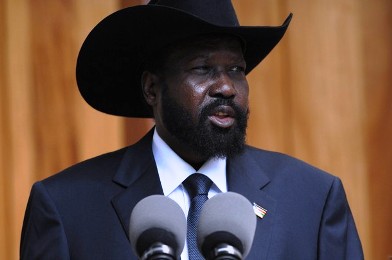S. Sudan president not attending next round of peace talks
February 22, 2015 (JUBA) – The South Sudanese president, Salva Kiir will not take part in direct talks with rebel leader, Riek Machar, when the next round of negotiations resume in Addis Ababa, officials said.

“Leaders will come to the final signing ceremony but the negotiations will be between the negotiating teams,” Lueth, a spokesperson for the government delegation at the talks, told Anadolu news agency.
The next round of negotiations, due on Monday, was to commence on Friday in Addis Ababa, but the regional bloc (IGAD) delayed the process after delegations from both sides arrived for the peace talks.
President Kiir, his spokesperson told Sudan Tribune, delegated his deputy, James Wani Igga to represent him at the Addis Ababa talks.
Analysts, however, argued that the new arrangement could be an attempt by the South Sudanese government not to portray direct negotiations involving the president and his former deputy as a deal seeking to settle political and ethnic differences between the two main rival tribes, but rather be seen as a national issue, involving the participation of the vice president and other prominent figures from different regions.
“They want to avoid characterization of the conflict as a fight between the Dinka and the Nuer by involving other people, especially James Wani Igga,” said Anthony Sebit.
“The president wants to avoid interpretations that would portray or suggest that the current peace talks in Ethiopia and the reunification dialogue in Tanzania are attempts to settle differences between the two tribes,” he stressed.
CONFIDENCE-BUILDING
But cabinet affairs minister, Martin Lomuro said Kiir’s initial involvement in direct negotiations with Machar helped to build confidence in the negotiations and to demonstrate the level of commitment of his government towards resolving governance and political differences through peaceful dialogue instead of violence.
“Peace talks to resolve political differences around the world are not necessarily resolved by the direct involvement of the president in the negotiations,” Lomuro said on Sunday.
“The differences are negotiated by the representatives and this is what the government has done,” he added.
Early this month, president Kiir and opposition leader Machar partially signed a symbolic power-sharing agreement proposed by IGAD recommitting themselves to further negotiations on outstanding issues.
According to the new power ratios, the South Sudanese government will take up 53%, the SPLM-factions 33%, while other political parties will share the remaining slots.
The parliament will now be expanded to 548 members and shall be dissolved and reconstituted according to the power ratios.
This means the government will comprise 290 members, while the breakaway SPLM factions and other political parties will make up 181 and 77 members respectively.
(ST)
